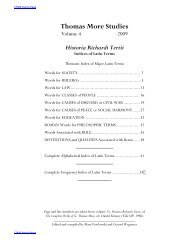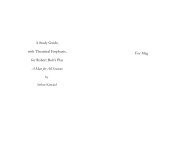life of john picus earl of mirandola - The Center for Thomas More ...
life of john picus earl of mirandola - The Center for Thomas More ...
life of john picus earl of mirandola - The Center for Thomas More ...
Create successful ePaper yourself
Turn your PDF publications into a flip-book with our unique Google optimized e-Paper software.
5<br />
10<br />
15<br />
20<br />
25<br />
Life <strong>of</strong> John Picus<br />
and yet had we leuer° always by knowledge never find that thing that<br />
we seek, than by love to possess that thing which also, without love,<br />
were in vain found.” 1 ¦<br />
⌐ Of his Liberality and Contempt <strong>of</strong> Riches. ¬ Liberality only in him<br />
passed measure: <strong>for</strong> so far was he from the giving <strong>of</strong> any diligence to<br />
earthly things that he seemed somewhat besprent° with the freckle° <strong>of</strong><br />
⌐ negligence. ¬2 His friends <strong>of</strong>tentimes admonished him that he should<br />
not all utterly despise riches, showing him that it was his dishonesty and<br />
rebuke when it was reported (were it true or false) ⌐ that his negligence<br />
and setting naught by money ¬ gave his servants occasion <strong>of</strong> deceit<br />
and robbery. Nevertheless, that mind <strong>of</strong> his (which evermore on high<br />
cleaved first in contemplation and in the ensearching <strong>of</strong> nature’s counsel)<br />
could never let down itself to the consideration and overseeing <strong>of</strong><br />
these base, abject, and vile earthly trifles.¦ His high steward came on a<br />
time to him and desired him to receive his account <strong>of</strong> such money as<br />
he had in many years received <strong>of</strong> his: 3 ¦ and brought <strong>for</strong>th his books<br />
<strong>of</strong> reckoning.¦ Picus answered him in this wise, “My friend (saith he),<br />
I know well ye might have <strong>of</strong>tentimes and yet may deceive me and<br />
ye list;° where<strong>for</strong>e the examination <strong>of</strong> these expenses shall not need.<br />
⌐ <strong>The</strong>re is no more to do: ¬ if I be aught in your debt I shall pay you by<br />
and by; if ye be in mine pay me, either now if ye have it, or hereafter<br />
if ye be now not able.”<br />
⌐ Of his Loving Mind and Virtuous Behaviour to his Friends. ¬ His ⌐ lovers<br />
and ¬ friends with great benignity ⌐ and courtesy ¬ he entreated, whom<br />
he used in all secret communing virtuously to exhort to Godward, 4<br />
whose godly words ⌐ so effectually wrought in the hearers ¬ that where<br />
1 leuer rather / 6 besprent covered, besprinkled / freckle rash / 19 list desire, wish<br />
¦ 3 Here <strong>More</strong> omits a sentence telling <strong>of</strong> how Picus <strong>of</strong>ten repeated a saying <strong>of</strong> St. Francis—<br />
Tantum scit homo quantum operator, “A man knows only as much as he puts into practice” (CW<br />
1:326, 327). / 14 <strong>More</strong> omits a passage in which Gianfrancesco recalls an occasion when he<br />
observed Picus attending to an account sheet presented to him by his butler. When questioned<br />
by Gianfrancesco, Picus replied that he did so only to humor those close to him who had not<br />
only begged but even demanded that he fulfill his duty (see CW 1:327). / 16 <strong>More</strong> omits quo<br />
securius menti suae consuleret, “so that he could have some peace <strong>of</strong> mind about it” (CW 1:326, 327).<br />
/ 17 <strong>More</strong> omits percepimus and alters what remains accordingly (CW 1: 326).<br />
1. “But now…found”: A citation from the fifth chapter <strong>of</strong> Picus’ De Ente et Uno ad Angelum Politianum.<br />
2. besprent with the freckle <strong>of</strong> negligence: <strong>More</strong>’s translation <strong>of</strong> the Latin incuriositatis naevo macularetur,<br />
“flecked with the mole <strong>of</strong> carelessness” (CW 1:326, 327).<br />
3. his: While all the <strong>earl</strong>y editions read “his,” Edwards argues that both the original Latin and the<br />
syntax <strong>of</strong> <strong>More</strong>’s English reveal this to be a misprint <strong>for</strong> “him” (CW 1:222).<br />
4. whom . . . to Godward: <strong>More</strong> alters the Latin quibuscum hortatoriis ad benevivendum locutionibus uti<br />
solebat, “commonly addressing them with exhortations to lead good lives” (CW 1:328, 329).<br />
19<br />
[68]<br />
A short audit and<br />
a godly<br />
Friends











